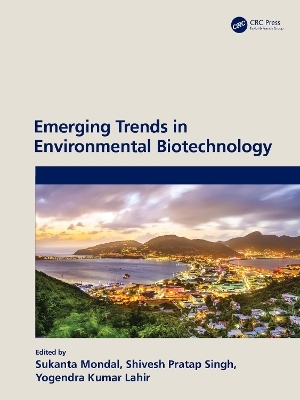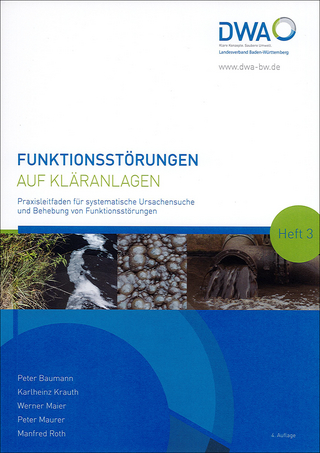
Emerging Trends in Environmental Biotechnology
CRC Press (Verlag)
978-1-032-03025-8 (ISBN)
The environment is an all-encompassing component of the ecosystem of "Blue planet - the earth", made up of the hydrosphere, atmosphere and lithosphere. These three spheres have biotic and abiotic components which exhibit ecological homeostasis that provides the most appropriate survival chances for the members of biotic component and geochemical balance with abiotic components. This ecosystem is subjected to relatively harsh conditions, mostly created by the disastrous activities due to natural calamities and intentional and/or accidental anthropogenic activities. Biotechnology has become a potential tool to dissipate such environmental impacts because of the advancement it has undergone recently.
Emerging Trends in Environmental Biotechnology is an outstanding collection of current research that integrates basic and advanced concepts of biotechnology such as genomics, proteomics, bioinformatics, sequencing, and imaging processes to improvise and protect the environment. This book is particularly attractive for scientists, researchers, students, educators and professionals in environmental science, agriculture, veterinary and biotechnology science. The book will enable them to solve the problems about sustainable development with the help of current innovative biotechnologies such as recombinant DNA technology and genetic engineering which have tremendous potential for impacting global food security, environmental health, human and animal health and overall livelihood of mankind.
Features
Presents easy-to-read chapters
Information is presented in a very accessible and logical format
Identifies and explores biotechnological approaches for environmental protection
Encompasses biodegradation of hazardous contaminants, biotechnology in waste management, nanotechnology, and issues in environmental biotechnology research
Dr. Sukanta Mondal is currently working as Principal Scientist, Physiology Division, ICAR-National Institute of Animal Nutrition and Physiology, Bangalore, India. He completed post graduation from National Dairy Research Institute and Ph.D. from the Indian Veterinary Research Institute, Bareilly. He has 24 years of research experience in environmental genomics. He has 134 research publications, written 13 book chapters, and edited 3 books published by Elsevier. He is editor-in-chief of Current Research in Poultry Science. He was awarded with G. P. Talwar Midcareer Scientist Award, DBT Overseas Associateship Award, and ISSRF Young Scientist Award. Dr. Shivesh Pratap Singh is Chairman, Central Board of Studies, M.P. Higher Education, Bhopal and Chairman, Board of Studies A.P.S. University, Rewa and Professor and Head, P.G. Dept. of Zoology, Govt. Autonomous P.G. College, Satna (M.P.). He has edited seventeen text books and published more than 80 research papers in reputed journals. He got Appreciation award in 1997 from Society for Science and Environment and received Gold medal in 1998, 2000, 2009 and 2012 from Zoological Society of India. Dr. Singh was also awarded gold medal by ICCB & MSET and Indian Academy of Environmental Sciences in 2009 and 2012. Recently he was awarded G.D. Bhalerao Gold medal 2017 by Zoological Society of India at Barrackpore. Dr. Y.K. Lahir is Visiting Faculty of Department of Biophysics, University of Mumbai, Department of Zoology, Thakur College of Science and Commerce (Autonomous body), Kandivli (east), Mumbai. He is Life member of The Indian Biophysics Society, Society for Radiation Research, and Environmental Mutagenic Society of India. He published three books on toxicology, one book on interaction between nanomaterials and biomolecules; one chapter on fullerene. He published 59 articles in national and international journals. He is on reviewer and editorial panels of six national and international journals.
Chapter 1 Environmental Biotechnology: An overview
Chapter 2 Biotechnology in Waste Management
Chapter 3 Role of absorption and adsorption in removal of waste
Chapter 4 Biotechnological Approach for Wastewater Management: Constructed Wetland is Green Solution
Chapter 5 Multi Soil Layering (MSL) System for Treatment of Domestic Wastewater
Chapter 6 Nanotechnology and its implications in the environmental biotechnology
Chapter 7 Climate change impact on livestock reproduction
Chapter 8 Biosurfactants and their Applications in Environmental Cleanup
Chapter 9 Biobased fuel and chemicals from lignocellulosic biomass- Prospects & Challenges
Chapter 10 Impact of CRISPR based gene editing in Environmental Biotechnology
Chapter 11 Biotechnological approaches for increasing production and utilization of natural fibres for cleaner and greener environment
Chapter 12 Sustainable development in Environmental Biotechnology
Chapter 13 Policies and Issues in Environmental Biotechnology Research
Chapter 14 Enzymes in environment management
Chapter 15 Health Issues and Environmental Biotechnology
Chapter 16 Socioeonomic status and its relation to pollution
Chapter 17 Gene-environment interaction and risk of chronic kidney disease of uncertain etiology
Chapter 18 Biodegradation of hazardous contaminants and pesticides
Chapter 19 Environmental Biotechnology: Public perception
Chapter 20 Biodegradation of Hazardous Contaminants And Pesticides
| Erscheinungsdatum | 16.06.2022 |
|---|---|
| Zusatzinfo | 33 Tables, black and white; 17 Line drawings, color; 33 Line drawings, black and white; 3 Halftones, color; 2 Halftones, black and white; 25 Illustrations, color; 30 Illustrations, black and white |
| Verlagsort | London |
| Sprache | englisch |
| Maße | 210 x 280 mm |
| Gewicht | 1097 g |
| Themenwelt | Technik ► Umwelttechnik / Biotechnologie |
| Weitere Fachgebiete ► Land- / Forstwirtschaft / Fischerei | |
| ISBN-10 | 1-032-03025-9 / 1032030259 |
| ISBN-13 | 978-1-032-03025-8 / 9781032030258 |
| Zustand | Neuware |
| Informationen gemäß Produktsicherheitsverordnung (GPSR) | |
| Haben Sie eine Frage zum Produkt? |
aus dem Bereich


